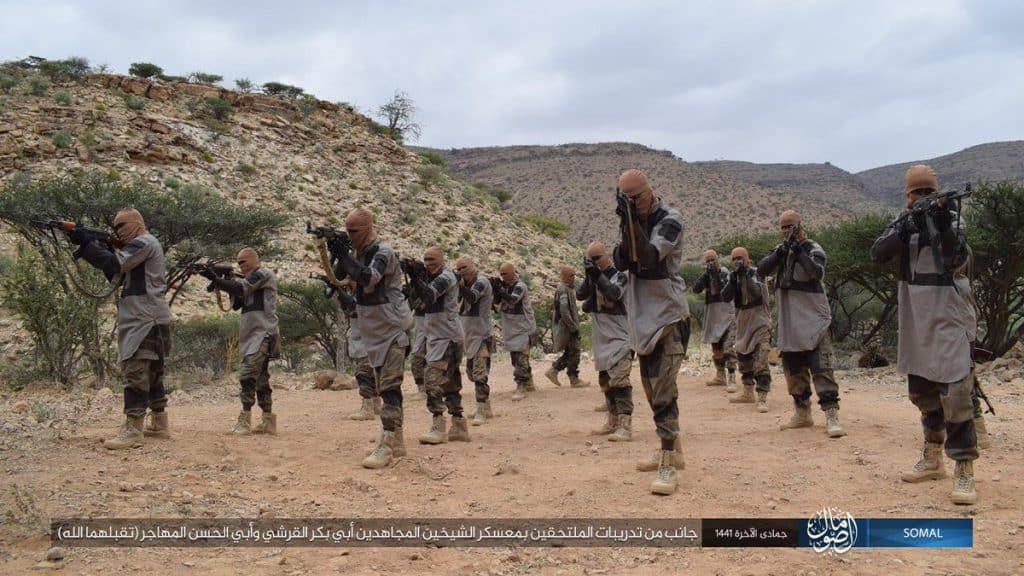
During the course of May, Somalia witnessed a relative uptick in Islamic State claimed attacks compared to recent months. However, this activity was offset by significant setbacks dealt to the organization across the country.
In total, the Islamic State in Somalia (ISS) claimed just four attacks in May according to data maintained by FDD’s Long War Journal. While this number is minuscule compared to other Islamic State branches around the world, this number represents a relative boost since the beginning of the year.
In February and March, the Islamic State released only four total claims from Somalia. And in April, the group stated its responsibility for three raids. The total amount of claims for May matches the number for January at four.
Additionally, three of the four claims in May were part of the Islamic State’s global “Battles of Attrition” campaign. This campaign, in which other branches also saw relative boosts to their activities, was meant to signal the group’s staying power in the face of a global battle against it.
The first use of this moniker was in April 2019 when then-Islamic State leader Abu Bakr al Baghdadi urged his followers to conduct a “battle of attrition” in order to “drain the enemies of their resources.”
The relative increase in activity inside Somalia last month is likely explained by ISS participating in this renewed campaign. That said, only one of the Islamic State’s claimed operations inside Somalia in May can be confirmed by local media.
On May 18, the group stated its responsibility for detonating an improvised explosive device (IED) on a vehicle belonging to the Somali military in Mogadishu the previous day.
Local media indeed reported an IED on Somali troops in Mogadishu on May 17. This attack was also unclaimed by Shabaab, Al Qaeda’s branch in East Africa, thereby giving more veracity to the Islamic State’s communiqué.
The other three alleged assaults have so far not been confirmed by local sources.
At the same time, local media has reported additional clashes between ISS and Shabaab in Somalia’s north-central region of Mudug.
According to Garowe Online, several clashes between the two were reported near the town of Dasaan where earlier rounds of infighting has also taken place.
The outlet goes on to cite Abdiqani Hassan, a local Reuters correspondent, that the Islamic State’s men reportedly gained the upper hand in the fight.
The renewed battles between the jihadist groups marks the first instances of the infighting since early last year. The two groups have been fighting each other since the emergence of the Islamic State in Somalia in late 2015.
Garowe Online‘s report also notes that some of Shabaab’s men fled the region for Puntland’s mountains, where both Shabaab and ISS maintain refuge. However, this cannot be independently verified.
Shabaab has recently been quite active in Mudug, where it killed the regional governor in a suicide bombing on May 17.
Suffering setbacks
While all of this was occurring, ISS suffered several blows in Puntland and Mogadishu. On May 9, Puntland Security Forces (PSF) killed a purported member of the group’s amniyat [internal security force] wing near Bosaso.
Photos released by the PSF following the raid also show captured explosive material, indicating the breakup of a potential bombing inside the city. And only two days later, three other ISS members were also arrested by the PSF in Bosaso.
On May 13, the PSF captured several IEDs and suicide belts from Islamic State safe-houses in Bosaso. While on May 25, the PSF launched major security operations in several areas near Bosaso which purportedly captured dozens of ISS militants.
Puntland officials have also stated that one of the militants captured during the raids is the “driver for Abdulqadir Mumin,” the overall leader of the Islamic State’s branch in Somalia.
If confirmed, this could provide additional intelligence for the PSF as it continues to mount pressure on ISS.
These raids also follow additional strikes against the group earlier this year. In April, Somali intelligence reportedly captured the head of the ISS branch in southern Somalia. This has yet to be confirmed, however.
And in March, the PSF launched other security operations in Bosaso, which reportedly captured members of both ISS and Shabaab. A senior ISS leader was also reportedly killed by the PSF in January.
These security operations have undoubtedly impacted ISS’ operational capabilities in Puntland. While the group still sporadically claims operations inside Bosaso, the majority of its claims this year have been focused on Mogadishu and its suburbs.
Local security operations, infrequent U.S. drone strikes, and clashes with Shabaab have all greatly reduced the Islamic State’s capabilities inside Somalia. With the zenith of its activities in 2018, it has steadily seen a decline in operations since last year.
That said, it has shown the capability to retain its bases in Puntland’s mountains. Earlier this year, the group highlighted a training camp there, while the UN noted in January that ISS’ bases in the mountains have acted as a “command center” for the Islamic State’s Central African Province.







